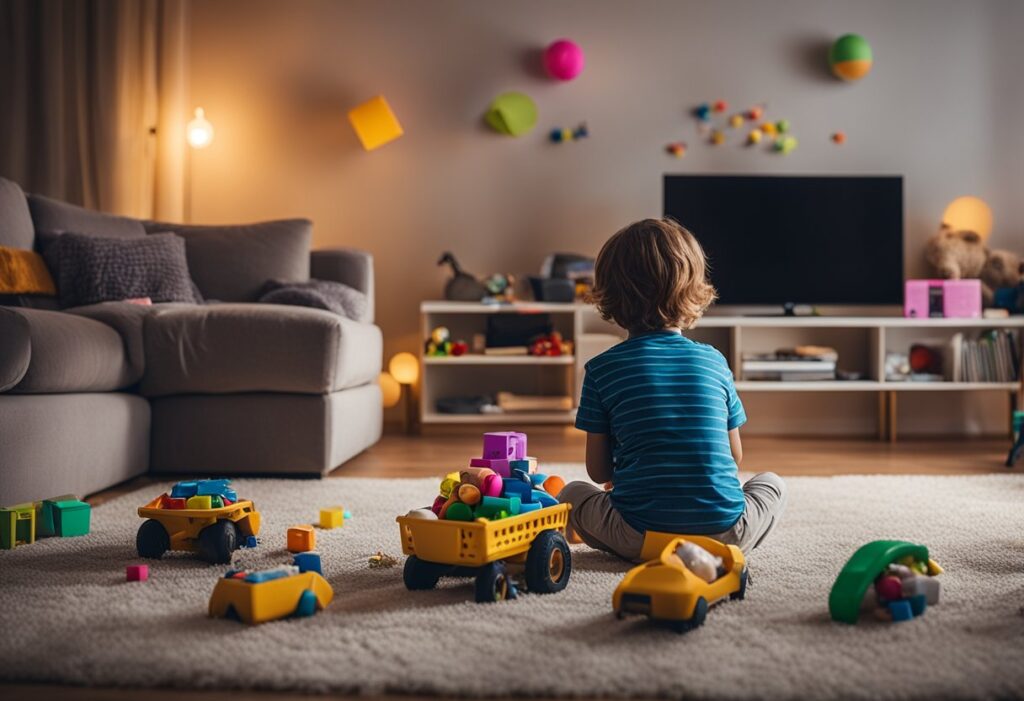Being a lazy mom or dad has its perks.
Kids become more responsible and independent.
But when does lazy parenting reach toxic levels and turn into uninvolved parenting? What if being a lazy mom is taking its toll on your kids and they feel neglected?
Well, let’s see the signs of a lazy mom (or dad) and its consequences on kids.
Before starting let me tell you one thing: It’s natural for you to have moments when you just want to take a break and indulge in some well-deserved downtime.
However, it’s when these moments become a recurring pattern and you seem uninvolved in matters related to your home or kids for a long time that it becomes troublesome.
Understanding these signs is important so that you can introspect and see if any changes need to be made in order to strike a better balance between your self-care and your responsibilities as a parent.
This knowledge will help you become more self-aware and provide guidance on whether you need to make adjustments in your parenting approach.
Disclaimer: All the points mentioned below can be applicable to not only mothers but also fathers, as they both hold parenting responsibilities. But since the readers are mostly moms, I have written this article with moms in mind.
10 Surefire Signs of a Lazy Mother
1. Lazy mothers neglect household responsibilities
It’s essential to recognize that being a “lazy mom” doesn’t necessarily mean you’re a bad parent.
Sometimes, it can be a form of self-preservation as it allows you to focus more on your well-being and manage stress in a better way.
However, when laziness leads to neglecting household responsibilities, it can create problems for both you and your family.
A sign that you might be neglecting household tasks is if you frequently let the dishes pile up in the sink or the laundry goes unwashed for extended periods.
While everyone gets overwhelmed from time to time, consistently avoiding these chores can create a cluttered living environment and make your home less comfortable for you and your children.
Another indicator of neglecting household responsibilities is if you’re not keeping track of important appointments and events.
Missing your child’s doctor’s appointment or forgetting about a school event can be signs that you’re not fully engaged in managing your family’s routine.
Consequences on kids: Kids depend on moms mostly for their primary needs. So when those are neglected, may struggle with feelings of abandonment, low self-esteem, and depression.
They also can act out in school or at home, engage in risky behaviors, and have difficulty forming healthy relationships with others.
And not all moms love cooking. Even though it’s okay to buy takeouts and feed your kids pizza or burger when you have no energy to enter the kitchen, when it continues frequently, due to not eating good nutritious foods, children may suffer from malnutrition, poor hygiene, and other health issues that can impact their growth and development.
To improve your engagement with household responsibilities, consider the following tips:
- Break tasks down into smaller, manageable chunks and tackle them one at a time.
- Establish a routine and stick to it, ensuring that essential chores are completed daily or weekly.
- Use tools like calendars, planners, or digital apps to help you stay organized and keep track of your family’s schedule.
By making some small changes and being more mindful of your responsibilities, you can ensure that your home stays organized, your children’s needs are met, and your well-being is preserved.
Related: How to be an organized mom (14 tips you’ll wish you knew sooner)
2. Lazy moms are not involved in children’s activities
When you’re a mother, it’s essential to be involved in your children’s activities. A lack of participation can be a sign of a lazy parent. In these situations, children may feel ignored or unsupported, and this can have long-lasting effects on their development and self-esteem.
Being consistently absent from your child’s activities, such as skipping their sports games or failing to show up for school meetings, can demonstrate a lack of commitment to your child’s well-being.
This disengagement can lead to a sense of isolation for your child and hinder their social and emotional growth.
What to do instead:
Not only does involvement in your child’s activities show your support, but it also provides an opportunity for you to bond and create lasting memories together. Be mindful of your child’s interests and hobbies, and try to find ways to participate or at least show your encouragement.
A nurturing and present parenting style sets a strong foundation for their future. So, make an effort to be present and engaged in your child’s activities, and your children will feel the love and support they need to thrive.

3. They don’t want to deal with the tantrums and tears
Another sign of a lazy mother is not wanting to deal with the emotional ups and downs of their children.
Instead of addressing their child’s emotions and helping them process complicated feelings, they may take the easy way out. This could mean giving their child a screen to distract them from their emotions, rather than providing emotional support and guidance.
You might notice this behavior in moms in a variety of ways.
For example, a mother might be quick to offer her child a tablet or phone when the child is upset, in an effort to keep them quiet instead of addressing the root cause of their distress.
This avoidance of dealing with emotions can be detrimental to a child’s emotional development and overall well-being.
Another example could be a mother who consistently avoids conversing with her child about their feelings.
Instead, the mother might resort to dismissive statements such as “You’ll be fine” or “Just get over it.”
This lack of empathy and unwillingness to acknowledge the child’s emotions can lead to a strained parent-child relationship.
Additionally, a lazy mother might not bother to teach her child coping strategies as they navigate their emotional journey. Without these tools, the child may struggle to regulate their emotions and manage stress in the long run.
Bear in mind that these examples of neglecting a child’s emotional needs should be seen as a pattern rather than isolated incidents.
Every parent might occasionally choose the easy path due to personal or circumstantial reasons (all are humans!), but repeated occurrences of such behavior might indicate laziness in dealing with it.
4. They rely too much on screens and devices and don’t pay attention to kids
We always talk about kids having too much screen time.
But do we stop and think about our own screen time?
Let’s face it. We all love watching those reels or TikToks or shorts when we want to unwind or just want to engage in mindless scrolling forgetting everything else.
But what if your kids are vying for your attention standing beside you, calling “Mom, mom, look at me!!!”
Well, it’s okay to spend time on your screens without feeling guilty, but when it’s at the cost of not giving your child the attention they need, it can be problematic.
If your child complains that you are always on your phone and don’t talk to them, take that as a sign to dial down on your screen use.
Not only yours but also your child’s.
It’s important to recognize the warning signs of overusing screens and devices in your family.
If you often use technology as a babysitter or a substitute for quality time, it’s time to reassess your parenting habits.
Additionally, if your or your family’s screen time interferes with essential activities such as homework, family meals, or face-to-face conversations, it should be a cause for concern.
What to do instead:
To avoid falling into the trap of over-reliance on screens and devices, it’s essential to establish some ground rules.
Set limits on daily screen time, and set a time daily for mindful interaction with family.
Focus on creating daily, weekly, and monthly family rituals which will ensure that you get enough time for them.
Kids don’t require a lot of time from you every day. Focus on “consistent quality time” instead of quantity.
Creating a healthy balance between technology and real-life interactions will help you set a good example for kids as well.

5. Lazy moms fail To set boundaries and discipline children
As a parent, it’s essential to set boundaries for your children and enforce discipline when necessary.
A lazy mother might fail to establish these important boundaries, which can lead to a range of harmful consequences.
One sign of a lazy parent is not monitoring your child’s bad behaviors. Because we know how hard it is to be consistent with discipline.
The kids are not going to always comply with the rules, and parents might have to face opposition from them in the form of tantrums and backtalk. It’s not easy!
And it’s always wise to choose your battles carefully preserving your energy for the most important matters.
But if you never put any energy or effort into disciplining them, it can be considered lazy parenting.
When a parent doesn’t correct misbehavior, children can struggle with understanding the boundaries of acceptable conduct.
Over time, unchecked negative behaviors can pose challenges in a child’s social and academic life.
In some cases, a lack of involvement in a child’s life can lead to what is known as uninvolved parenting or neglectful parenting.
This style is characterized by a lack of responsiveness to a child’s needs and can cause significant emotional and psychological harm in the long run.
Another aspect to consider is the lack of discipline. A parent who is too lenient or inconsistently enforces rules might be exhibiting permissive parenting.
This type of parenting makes few demands on children and sets low expectations for self-control and maturity, which can lead to a lack of responsibility and accountability in their behavior.
What to do instead:
It’s crucial to be conscious about setting and maintaining boundaries with your kids.
Striking a balance between being loving and compassionate, while also being firm and consistent in enforcing rules, can help your children develop a strong sense of self-esteem, independence, and responsibility.
Related posts:
- What is positive discipline? 15 positive discipline techniques that work (and do not break their hearts)
- 10 effective ways to stop yelling at kids when angry
- 11 ways to make kids listen without yelling or nagging
- What is positive or negative reinforcement and positive or negative punishment (explained with examples)
- How to discipline strong-willed kids: 18 must-know strategies
- 16 signs you’re raising a spoiled teenager & how to fix it

6. Lazy moms disregard their wellness
It’s essential to maintain a balance between taking care of your child and maintaining your wellness.
As a mother, you might be prone to disregard your own physical and emotional health, which could be a sign that you are overly relaxed or somewhat lazy.
One common aspect of neglecting personal wellness is the consistent neglect of self-care routines.
When you frequently ignore your exercise routine, forget to eat nutritiously, or fail to get enough sleep, it can hinder your ability to provide the best care for your child.
Taking care of your well-being enhances your energy levels, reduces stress, and provides a better foundation for parenting.
Another sign of disregarding personal wellness is a lack of organization in your daily life.
You might find yourself constantly misplacing essential items, struggling to manage household chores, or failing to stay on top of appointments for your child.
An organized lifestyle is key to managing the various responsibilities of motherhood and looking after yourself too.
Ignoring social connections and relationships with friends and family can also be a sign of prioritizing laziness over personal wellness.
While it’s natural to be busy with your child, maintaining a support network is crucial for both your mental health and your ability to cope with the challenges of parenthood.
Remember that nurturing your relationships with others is just as vital as looking after your physical health.
In summary, to avoid being a lazy parent, make conscious efforts to pay attention to your wellness.
Regular self-care, building an organized lifestyle, and preserving social connections are essential components in fulfilling your parenting responsibilities to the best of your abilities.
7. They make older siblings take care of younger ones
As a parent, your primary responsibility is to provide love, care, and support to your children.
However, there are times when some parents may rely heavily on their older children to take care of their younger siblings.
This is called parentification and has many adverse effects on those older kids who have to shoulder the burden.
Although it’s normal for siblings to help each other occasionally, excessive dependence on older siblings can have adverse effects on both children.
And trust me, it is a common occurrence among lazy parents.
In such cases, it is crucial to recognize the warning signs of a lazy parenting approach.
One clear indication is when you consistently leave your older child in charge of their younger siblings, without any valid reason.
As a result, the older sibling may become overwhelmed with the added responsibility while the younger ones might feel ignored, creating a rift in the family dynamic.
Moreover, requiring older siblings to manage younger ones can lead to unequal power distribution within the family.
This might cause the younger children to feel powerless and dependent on their siblings, impacting their self-esteem and sense of autonomy.
At the same time, it can push the older siblings into a constant caretaker role, depriving them of their independence and opportunities for growth.
As a result, these kids have to mature faster than they need to missing out on their freedom as a child.
What to do instead:
To avoid this, find a balance in the distribution of responsibilities among family members.
Delegate age-appropriate tasks to children while making sure to relieve your older children of their caretaker duties regularly.
This will allow everyone in the family to develop essential life skills, and it will prevent any resentment from festering among siblings.

8. Lazy moms blame kids for lack of time
One of the signs of a lazy mother is when she blames her children for her lack of time.
As a parent, it’s important to understand that children are not responsible for your time management or the amount of tasks you have to complete.
It’s your responsibility to organize your time and prioritize your tasks effectively.
In some cases, a lazy mother will use her children as an excuse to avoid doing necessary household chores or to take a break from her daily responsibilities.
This behavior not only puts undue pressure on the kids but also instills a sense of guilt in them for things that are beyond their control.
Remember, children didn’t ask to be born here. You are the one responsible for bringing them into the world.
Hence, it’s essential for you as a parent to acknowledge that managing your time and completing your responsibilities is your job, not your children’s.
Accepting this will allow you to create a more positive and supportive environment for your kids to grow up in.
What to do instead:
Instead of blaming your kids for your lack of time, try exploring ways to improve your time management skills.
This could include creating and following a daily schedule, setting realistic goals for yourself, and learning to delegate tasks when necessary.
By doing so, you’ll be able to provide your children with a healthier and happier upbringing, and you’ll become a more efficient and organized parent in the process.
Related posts:
- 4 major reasons why moms are always super tired (& tips to stop the exhaustion)
- 9 practical tips to stop being overwhelmed as a new mom
- 10 must-try tips to cure mom burnout and never get burned out again
9. Lazy mothers do not help kids with things and leave them on their own
One sign of a lazy mother could be when she consistently tells her kids to do it on their own or “Google that” instead of helping them understand or solve problems.
As a parent, it’s essential to strike a balance between guiding your children and encouraging them to seek answers on their own.
By always resorting to “Google that,” a mother may not be providing the necessary support and guidance her children need.
It might be true that the internet can provide quick and easy answers to many questions, but you should consider the potential disadvantages of relying solely on this approach.
Your children’s critical thinking and problem-solving skills might not develop as expected, making it difficult for them to handle complex situations in the future.
Moreover, this hands-off approach can affect your child’s emotional well-being.
A parent’s emotional support and genuine interest in their child’s life can have a significant impact on their self-esteem and confidence.
By dismissing their questions with “Google that,” you might inadvertently convey to your children that their concerns and curiosities are not important to you.
What to do instead:
Keep in mind that it’s alright to occasionally encourage your child to research answers themselves.
However, you must engage in meaningful conversations and help them understand the answers or solutions they find.
This can go a long way in fostering their curiosity and cognitive development while emphasizing that you care about their questions and well-being.
With the right balance and support, your children will gain the skills and confidence they need to tackle obstacles and challenges on their own.

10. Lazy moms might always yell to shut up kids using their authority and don’t show patience
One sign of a lazy mother is resorting to using their authority and constantly yelling at their kids to shut up instead of addressing the underlying issues patiently.
This can have long-lasting effects on your child’s development and mental health.
When you’re always yelling at your kids, they may become anxious and develop low self-esteem, leading to increased aggression in the future.
Moreover, the frequent use of harsh tones and raised voices creates a hostile environment in the home, making children feel unloved and unsupported.
It’s vital to understand that constant yelling doesn’t fix behavioral problems. It may only make the issues worse.
Children need guidance, understanding, and patience to learn and grow.
As a mother, it’s essential to nurture positive experiences with your kids rather than resorting to yelling.
To combat this unhealthy behavior, consider the following strategies:
- Recognize your triggers: Pay attention to the situations that make you feel irritable and anxious, leading you to yell. This will give you a better idea of when you’re more likely to lose your composure, allowing you to prepare and manage your reactions.
- Take a deep breath: When you’re about to lose your cool, pause and take several deep breaths. This simple practice can help calm your mind and give you a chance to think before reacting.
- Establish boundaries: Clearly define expectations with your children and discuss consequences for crossing those boundaries. This way, your kids will understand the rules, and you’ll have a healthier way of dealing with their behaviors.
Remember that as a mother, your responsibility is to create a loving, supportive, and healthy environment for your children.
Being aware of the signs of a lazy mother and proactively addressing them will result in both happier kids and a more fulfilling parenting experience.
Frequently Asked Questions

What are common indicators of poor parenting?
Poor parenting can manifest in various ways, such as a lack of communication, inconsistency in rules and discipline, and neglect of emotional needs. Parents who frequently criticize their children, show favoritism, or are overly controlling might also be exhibiting signs of poor parenting.
How do you recognize a lazy parent?
A lazy parent might spend excessive time on TV and social media, fail to engage in meaningful conversations or activities with their children, or neglect household responsibilities. They might struggle with maintaining consistent routines, discipline, and setting boundaries for their children.
What are the traits of a lazy person in parenting?
Lazy parenting traits might include a lack of interest in their child’s day-to-day life, frequently relying on electronic devices to entertain their child, avoiding or delegating parenting tasks to others, and failing to model healthy habits and behaviors for their child.
How can a mother avoid being lazy in raising her children?
To avoid being a lazy mother, establish routines and stick to them, prioritize quality time with your children, set appropriate boundaries, and be proactive in your child’s education and development. Remember to stay engaged, keep open lines of communication, and model positive behaviors.
How do you deal with a lazy mother?
Dealing with a lazy mother may involve having open and honest conversations about your concerns, offering support or assistance, and suggesting resources or services that can help improve parenting skills. If the situation is serious, consider consulting with a family therapist or counselor.
How do I stop being a lazy stay-at-home mom?
To stop being a lazy stay-at-home mom, try setting daily goals, creating routine schedules, and finding activities to keep you and your children engaged and stimulated. It can also be helpful to seek out social connections with other parents, take part in self-care, and find time for hobbies and interests.
Why is my mom so lazy?
Your mom may be experiencing fatigue, stress, or other factors that contribute to her perceived laziness. It’s important to consider the context and empathize with her situation before jumping to conclusions. Discuss your concerns openly with her, and encourage her to seek support if necessary.
